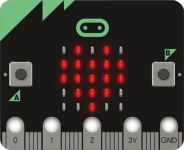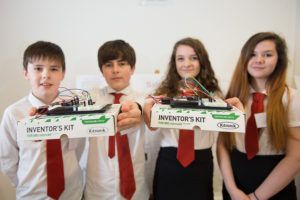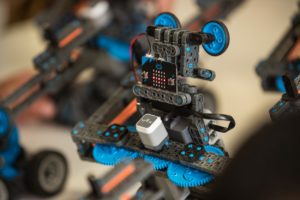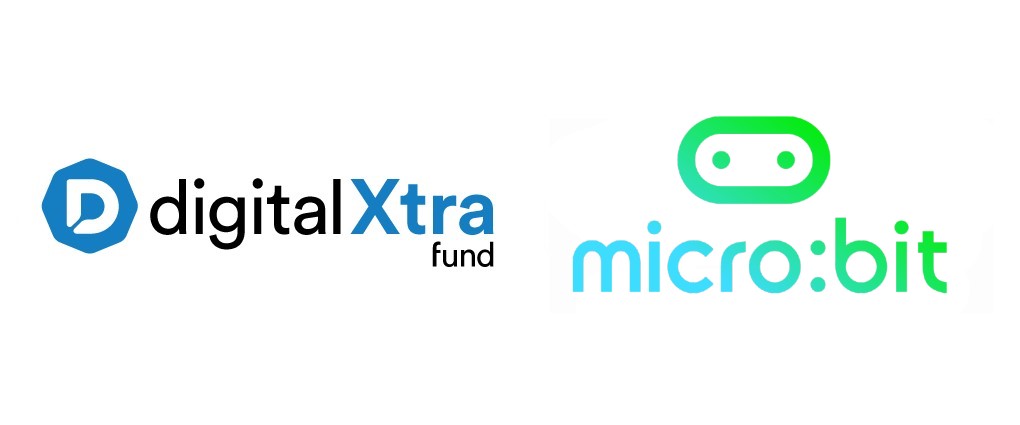Micro:bit Educational Foundation provides additional support for initiatives backed by Digital Xtra Fund
 Micro:bit Educational Foundation has donated 1,200 micro:bits to extracurricular digital skills initiatives supported by Digital Xtra Fund.
Micro:bit Educational Foundation has donated 1,200 micro:bits to extracurricular digital skills initiatives supported by Digital Xtra Fund.
Six initiatives across Scotland will benefit from a total of 1,200 micro:bits as part of their support from Digital Xtra Fund. The hardware, donated by Micro:bit Educational Foundation, will enable Apps for Good, Inverness Science Festival, McLaren High School, CodeBase Stirling, The Prince’s Trust, and West College Scotland to deliver activities beyond the initial funded programme run and help inspire even more young people into digital technologies.
The Micro:bit Educational Foundation’s vision is to inspire every child to create their best digital future by enabling children around the world to get creative with technology and invent in their schools, clubs, and at home. Similarly, Digital Xtra Fund is striving to give every young person in Scotland access to digitally creative activities regardless of their gender, background, or where they live by providing grant awards for exciting initiatives which inspire young people to understand and create with technology, not just consume it. Both organisations were created in 2016 and share very similar goals, presenting a natural opportunity to work together in Scotland.

Credit: Apps for Good
The six initiatives received grants as part of the 2017/18 Digital Xtra Fund grant awards to deliver a variety of exciting digital skills initiatives across Scotland. Each have a unique approach to engaging young people with digital technology. For instance, Apps for Good teaches young people how to build, market and launch digital solutions to address challenges faced by their community and a total of 332 micro:bits will be distributed to nine schools across Scotland who have enrolled in their Internet of Things course. The course explores the benefits and potential issues surrounding IoT and introduces participants to the technology underpinning IoT devices. Students learn how to build circuits using sensors and actuators so that they can understand the principles behind the technology. Resources are based on the micro:bit and Arduino microprocessor boards, so having the hardware on hand is key to learning the material. Schools will also retain the hardware, allowing them to reuse it to deliver future activities.
During last year’s Apps for Good IoT course, the award-winning solution ‘SafeStep’ was created using micro:bits by students at Dunoon Grammar School. It consisted of a range of potentially life-saving rugs with inbuilt pressure sensors that determined if somebody had fallen and uses an app to alert carers or loved ones.

Credit: Micro:bit Educational Foundation
West College Scotland will take a different approach to engaging young people with the micro:bits sharing a total of 500 units between three new coding clubs at Renfrewshire secondary schools and 27 primary and secondary teachers who took part in a training session hosted by WCS in association with Microsoft Education, Renfrewshire Council, and Paisley YMCA. The session focused on increasing teachers’ confidence and encouraging the use of coding in the classroom with each teacher receiving a set of micro:bits for use in their classroom. This training is vital to creating a strong ecosystem of computing activities in Renfrewshire as these teachers will now manage the current coding clubs as well as initiate new ones with the assistance of STEM Ambassadors and senior school pupils.
Kavita Kapoor, Chief Operating Officer, Micro:bit Educational Foundation said, “The impact of this initiative has been shown to be very positive and the Foundation is very proud to have supported the scheme ”
Kraig Brown, Partnerships & Development Manager, Digital Xtra Fund said, “Since 2016, initiatives supported by Digital Xtra Fund have engaged nearly 20,000 young people across Scotland. The real legacy of the Fund will be a strong ecosystem of extracurricular activities who have the right hardware and educator confidence to continue giving young people the opportunity to get hands on and creative with technology. Support from organisations like Micro:bit Educational Foundation is key to achieving this legacy.”
Digital Xtra Fund is currently developing the 2018/19 grant awards supporting digital skills initiatives across Scotland, many of which use the micro:bit to engage young people. The Fund is supported by a range of industry partners who share a common will to help young people succeed in a digital world including the Micro:bit Educational Foundation. The Foundation is also in the midst of rolling out their biggest and most exciting micro:bit coding challenge to date – the global micro:bit challenge – and has commissioned Lancaster University’s Department of Educational Research to research ‘Using Micro:bit Devices in Teaching and Learning’. The study seeks to explore how teachers and students have been using the micro:bit to support teaching and learning in computing as well as in wider cross-curricular ways.
About Micro:bit Educational Foundation
Micro:bit Educational Foundation’s vision is to inspire every child to create their best digital future. The Foundation is enabling children around the world to get creative with technology and invent in school, in clubs, and at home. The micro:bit is a handheld, fully programmable computer that was rolled out across the UK in 2016. It’s 70 times smaller than the original BBC Micro computers used in schools in the early 1980s, and now it has built-in sensors, an LED display and a Bluetooth radio, so it’s instantly interactive.
Started by the BBC and a team of partners, Micro:bit Educational Foundation is a non-profit organisation continuing the micro:bit programme and bringing it to schools and children around the world. The Foundation was established with the support of our founding partners in September 2016. Micro:bit Educational Foundation is a UK based organisation and redistributes the bulk of any surplus money generated into providing free devices to exceptional micro:bit educational programmes across the globe.

